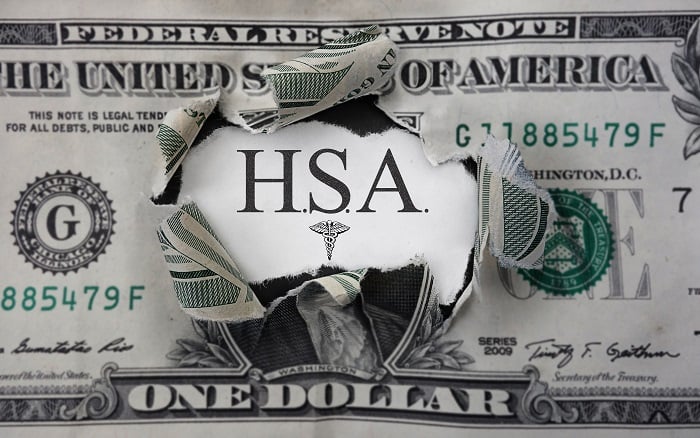 Health Savings Accounts Flexible Spending Accounts Related: Insurers give congress 3 ideas for making HSAs better
Health Savings Accounts Flexible Spending Accounts Related: Insurers give congress 3 ideas for making HSAs better Eligible expenses
- Individuals would now be able to purchase over-the-counter (OTC) medications with an HSA, FSA, or HRA without being required to obtain a prescription for eligibility purposes
- Menstrual care products would become qualified medical expenses that could be purchased with all tax-advantaged health care accounts
- Certain sports and fitness expenses – including gym memberships and the cost to participate in certain physical exercise programs – would be treated as qualified medical expenses up to a limit of $500 a year for an individual and $1,000 a year for a joint return
Contributions
- HSA contribution would be raised to $6,650 for individuals and $13,300 for families – the combined annual limit on out-of-pocket and deductible expenses under an HSA-qualified insurance plan in 2018
- Working seniors participating in Medicare Part A and covered by a qualifying HDHP would now be able to contribute to an HSA
- Individuals would no longer be barred from contributing to an HSA if his/her spouse is enrolled in a medical FSA – a disqualifying scenario currently
- Spouses over the age of 55 would be able to make “catch-up” contributions to the same HSA
Account balances
- At an employer's discretion, employees with an FSA or HRA that enroll in a qualifying HDHP with an HSA would be permitted to transfer balances from their FSA or HRA to the HSA. Transfers would be capped at $2,650 for individuals and $5,300 for families
- Health FSA balances could be carried over to the following plan year. This rollover could not exceed three times the annual FSA contribution limit
- First Dollar Coverage Flexibility for High Deductible Health Plans. Health plans can provide coverage for services before the deductible is met up to $250 a year for an individual and $500 a year for family coverage. This change will allow insurers to provide coverage for and incentivize the use of services that can reduce health care costs more broadly, such as primary care visits and telehealth services.
- Treatment of Direct Primary Care Service Arrangements. Under this proposal, a Direct Primary Care (DPC) service arrangement would not be treated as a health plan that would disqualify an individual from contributing to an HSA. For this purpose, a DPC arrangement is an arrangement under which an individual is provided primary care services by primary care practitioners and the sole compensation for such care is a fixed periodic fee that does not exceed an aggregate of $150 a month for an individual and $300 a month for a family. In addition, the fees for the arrangement are treated as qualified medical expenses.
- Certain Employment Related Services Not Treated as Disqualifying Coverage For Purposes of Health Savings Accounts. This section allows employers to offer free or discounted services at on-site or retail medical clinics without disqualifying an HDHP enrollee from contributing to an HSA so long as significant medical care benefits are not provided.
- Contributions Permitted If Spouse Has A Health Flexible Spending Account. Under current law, FSAs can be used to reimburse expenses for an individual and their spouses and dependents. This eligibility for FSA benefits disqualifies an otherwise eligible FSA enrollee's spouse from contributing to an HSA, even when each spouse is covered under a separate health plan. This provision allows an otherwise eligible FSA enrollee's spouse to maintain an HSA, so long as the aggregate expenses actually reimbursed from the FSA are limited exclusively to what the FSA enrollee would have been entitled to absent the spouse.
- FSA And HRA Terminations or Conversions to Fund HSAs. Employees are able, at the employer's discretion, to convert their FSA and HRA balances into an HSA contribution upon enrolling in a high deductible health plan with an HSA. The conversion amount is capped at $2,650 for an individual and twice that for family coverage. Any conversion taking place during the same year as the FSA or HRA contribution was made will count towards an enrollees' HSA contribution for that taxable year.
- Inclusion of Certain Over-The-Counter Medical Products as Qualified Medical Expenses. Removes Obamacare's restriction on over-the-counter medicines for all tax-favored health accounts and adds “menstrual care products,” defined as a tampon, pad, liner, cup, sponge, or similar product used by women with respect to menstruation or other genital-tract secretions, as a qualified medical expense for the purposes of these accounts.
- Certain Amounts Paid for Physical Activity, Fitness, And Exercise Treated as Amounts Paid for Medical Care. Qualified sports and fitness expenses are treated as qualified medical expenses up to a limit of $500 a year for an individual and $1,000 a year for a joint return. This includes amounts paid for membership at a fitness facility, participation or instruction in a program of physical exercise or physical activity, or safety equipment for use in a program of physical exercise or physical activity.
- Carryforward of Health Flexible Spending Arrangement Account Balances. This provision allows FSA balances to be carried over to the succeeding plan year so long as the balance in an account does not exceed three times the annual FSA contribution limit.
- Individuals Entitled to Part A of Medicare By Reason of Age Allowed to Contribute to Health Savings Accounts. This provision allows working seniors that are covered by an HSA-eligible HDHP and enrolled in Medicare Part A to contribute to an HSA.
- Maximum Contribution Limit to Health Savings Account Increased to Amount of Deductible and Out-Of-Pocket Limitation. Under current law, annual HSA contributions are limited. In 2018, the limit is $3,450 for an individual and $6,900 for family coverage. These limits are updated annually for inflation and are significantly less than the combined legal limit on annual out-of-pocket and deductible expenses. This provision would allow HSA-eligible individuals to contribute an amount equal to the combined annual limit on out-of-pocket and deductible expenses under their HSA-qualified insurance plan, which is $6,650 for an individual and $13,300 for a family in 2018.
- Allow Both Spouses to Make Catch-Up Contributions to the Same Health Savings Account. Under current law, if both spouses are HSA-eligible and age 55 or older, they must open separate HSA accounts for their respective “catch-up” contributions (an extra $1,000 annually). This provision would allow both spouses to deposit their catch-up contributions into one account.
- Special Rule for Certain Medical Expenses Incurred Before Establishment of Health Savings Account. Under current law, taxpayers may use HSA funds only for qualified medical expenses incurred after the establishment of the HSA, which might occur after the establishment of the associated HDHP. If, for example, the taxpayer purchases an HDHP and then immediately incurs medical expenses before opening the HSA, the taxpayer may not use tax-favored HSA funds to pay the expenses. This provision would treat HSAs opened within 60 days after gaining coverage under a HDHP as having been opened on the same day as the HDHP. This would allow for a reasonable grace period between the time coverage begins through an HDHP and the establishment of an HSA.
- Allowance of Bronze and Catastrophic Plans in Connection with Health Savings Accounts. Under this provision, a new pathway for HSA eligibility is created by allowing health plans qualified as bronze and catastrophic to be eligible plans for the purpose of making HSA contributions.
- Allowing All Individuals Purchasing Health Insurance in The Individual Market the Option to Purchase A Lower Premium Copper Plan. Under current law, only those under age 30 or those that qualify for a hardship exemption are able to purchase catastrophic or “copper” health plans and the risk pool for catastrophic enrollees is segregated from the rest of the market. This section amends the law to allow anyone to purchase a lower-premium catastrophic plan and combines the risk pool with the rest of plans in the market.
Andrew Gertz (andrew.gertz@connectyourcare.
© Touchpoint Markets, All Rights Reserved. Request academic re-use from www.copyright.com. All other uses, submit a request to [email protected]. For more inforrmation visit Asset & Logo Licensing.






